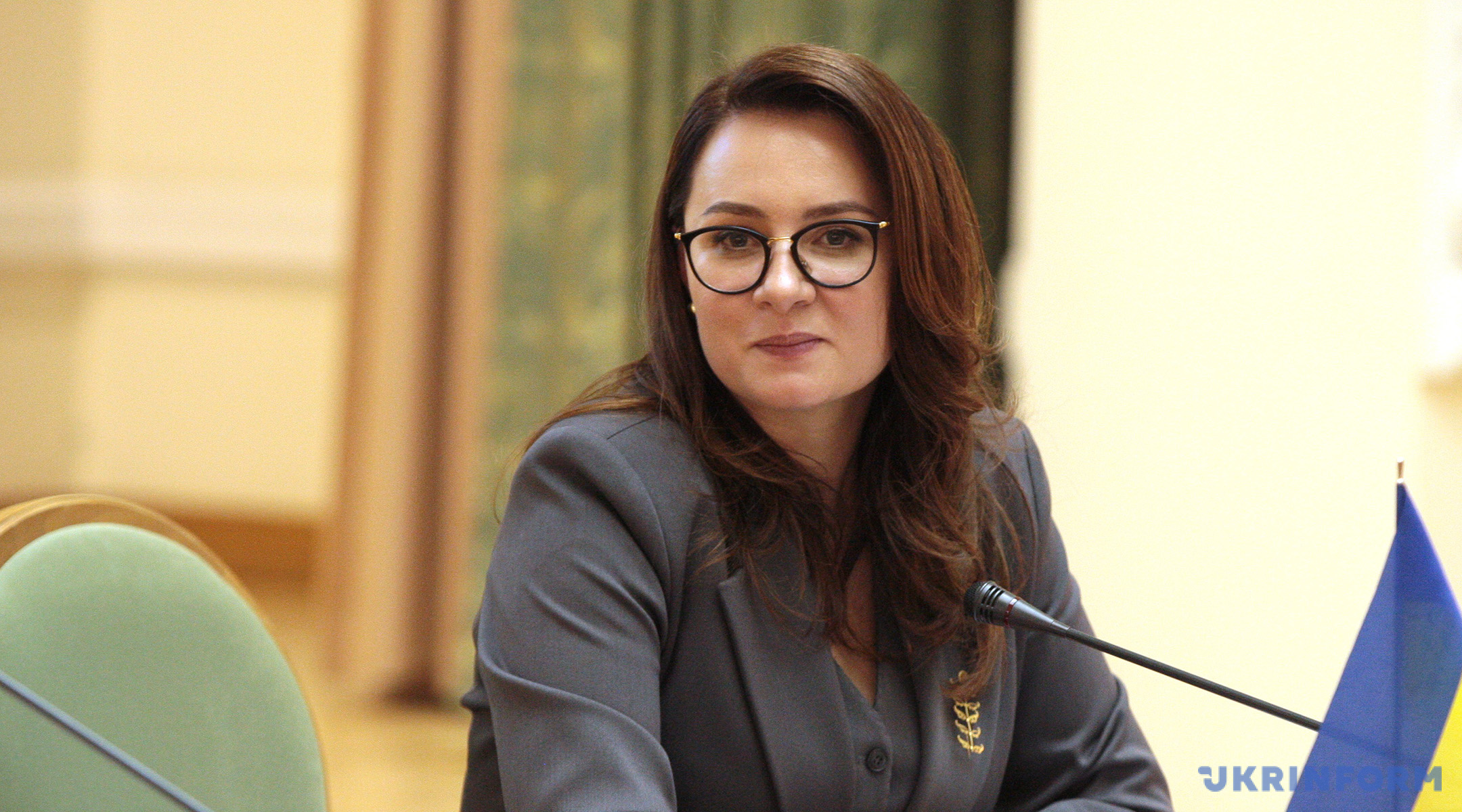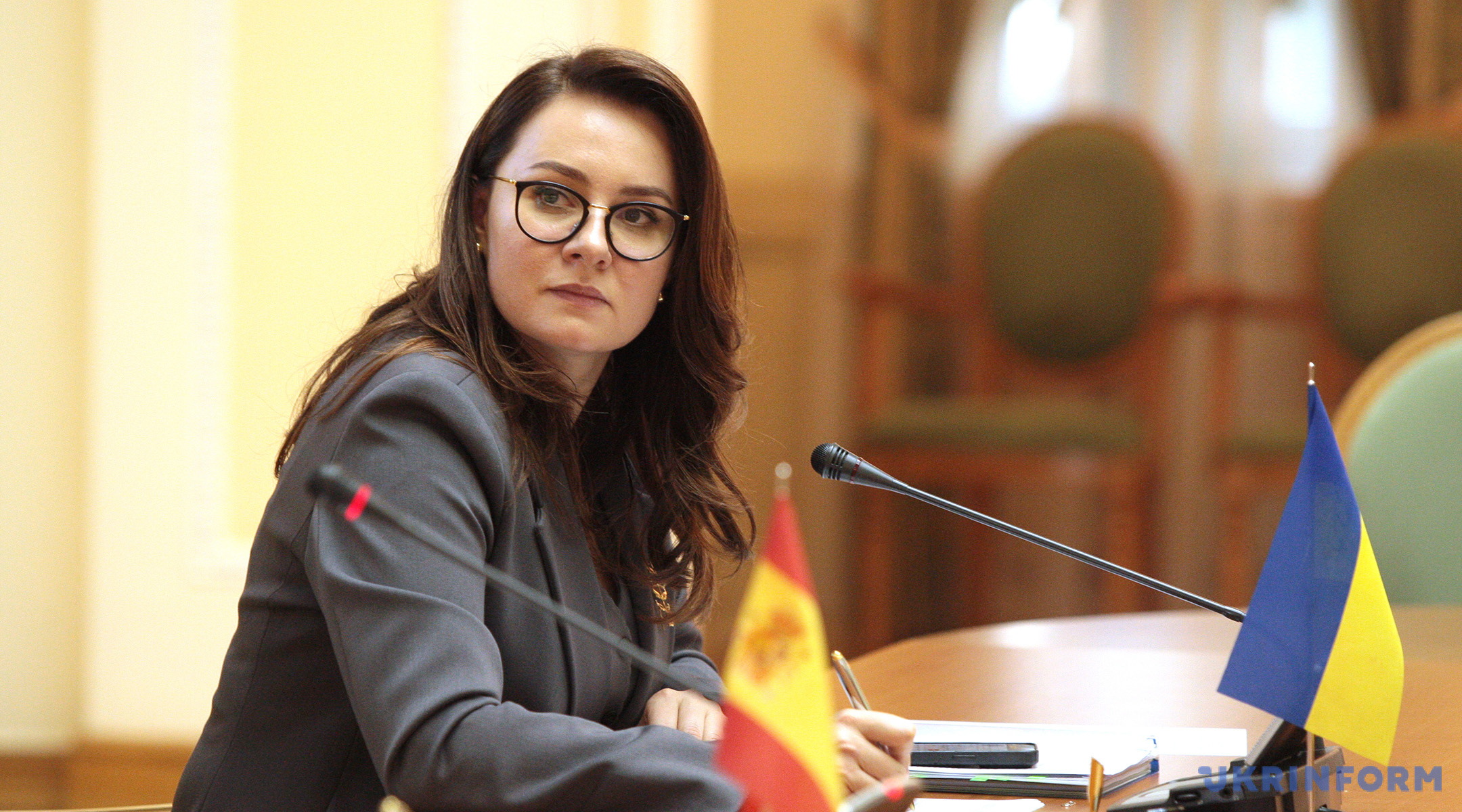The practical steps being undertaken as part of "Made in Ukraine" governmental initiative include the launch of the same-name platform, which overarches all government programs financing and providing preferential support to domestic business and the consumer market; the opening of 14 "Made in Ukraine" regional offices, which have already given nearly 1,500 consultations. And, most importantly, this includes tens of billions of hryvnias in loans and grants provided to thousands of Ukrainians so far this year, along with UAH 3 billion-plus worth of the export facilitating support funding provided via the Export Credit Agency.
Ukrinform met with Yulia Svyrydenko, First Deputy Prime Minister and Minister of Economy, on the sidelines of the 4th session of the Mixed Ukrainian-Spanish Intergovernmental Commission on Economic and Industrial Cooperation to talk about the interim results achieved by "Made in Ukraine" initiative and the prospects for its expansion and growth.

MADE IN UKRAINE
- The top areas of focus of the "Made in Ukraine" policy include the development of domestic production, facilitating non-raw materials exports and soliciting investments in the real sector of the economy. Has the policy brought the intended results? And what kind of support - preferential, grant, credit – was most effective in this?
- We have achieved progress in all areas. In a multidimensional policy like this, constituent programs are synergic, mutually powering each other.
Let me cite just a few figures: 11,000 lending agreements worth nearly UAH 44 billion have been concluded within the framework of the "Affordable Loans 5-7-9" program over this year so far. Furthermore, we have got the program refocused towards the investment component, and recently provided an opportunity to buy and install gas-powered power generation plants with loaned money.
To add to this, we have awarded over 660 grants to facilitate domestic production and create added value within the country. Alongside this, in 2024 the program expanded to cover UAV manufacturing projects and, additionally, a specialized "Create" program was launched to support manufacturing enterprises opened or managed by women.
Farm businesses have received UAH 19 million in compensation for the purchase of domestically manufactured machinery, and this is going to benefit agricultural machinery manufacturers, too, amid growing market. Just a week earlier, we expanded the national Registry of Agricultural Machinery Manufacturers eligible for such compensations. The Registry currently includes 101 businesses and over 8.500 machinery products.
Under the "School Bus" program, the Government has recently disbursed UAH 1 billion in subventions to local communities so that they could purchase buses for local schoolchildren on terms of co-financing. We are expecting that, as in previous years, the buyers’ preferences will be in favor Ukrainian-made equipment and suppliers. I am confident that Ukrainian businesses will be able to win relevant tenders honestly, because the buses they make are of good quality and those companies have sufficient capacity to satisfy the market demand.

Aside from the obvious benefit, which is increased output of new school buses, this program has an economic impact as well. This can be well seen from past years’ example. Thanks to the production of these vehicles in Ukraine, bus factories in Cherkasy, Zaporizhzhia, Chernihiv, as well as their subcontractors in several other cities were provided with sustained business. By varying estimates, bus factories and component suppliers collectively employ at least 10,000 workers, and each bus built in Ukraine takes the involvement of 200 plus subcontractors to manufacture, according to the Ukrainian Federation of Employers. Consequently, domestic businesses have received a momentum for growth and the national budget received much needed revenues.
In view of this, “Buy Ukrainian” means provision of thousands of jobs and empowering regional development and the economy as a whole.
Regarding the support for non-raw exports, Ukrainian exporters have been provided with UAH 3.12 billion worth of financial support over the past six months, using funds from the Export Credit Agency.
To encourage investment in the real sector, we have prepared the full package of documents on a support program to facilitate the growth of industrial parks. This mechanism is already working, parks are preparing documentation for submission.
As regards a support program for projects involving significant investments, we have finalized the full package of regulatory documents. One project has already passed through two assessment phases, received a favorable conclusion from the Ministry of Economy regarding its feasibility. We will submit a dedicated investment agreement for approval soon. Two more projects are going through the second phase of consideration, while five other applicants are compiling document packages to enter the program.
And last, but not least, is support for small and micro-size businesses. Nearly 6,000 grants have been awarded under the "Own business" program, which we expect will help create more than 10,000 new jobs. Another UAH 225 million worth of grant support was provided to over 500 veterans and families.
On a parallel track, "Made in Ukraine" regional offices continue to be opened. As of now, there have been launched 14 such offices - in Vinnytsia, Obukhiv, Lviv, Dnipro, Kryvyi Rih, Kamianets-Podilskyi, Chernivtsi, Sumy, Chernihiv, Poltava, Khmelnytskyi, Uzhhorod, Odesa, and Zhytomyr. Thus, if you are running a small or micro-size business, have questions about how to apply for a grant, fill out an application form or compile a business plan, you are welcome to come to the office to receive first-hand advice and submit a grant application. Also available are online consultations provided through the State Service for Employment’s official website or hotline.
- How does the production localization policy work? Which of the proposed mechanisms and incentives prove most effective?
- Work on this matter is in progress. We are planning amendments to regulatory acts on production localization. The document needs certain approvals, particularly from the relevant parliamentary committee before it will be submitted for consideration at a Cabinet of Ministers meeting. The changes made will be made public later on.
In addition, we have updated procedures for the registration of products that need to involve a certain percentage of locally made components to qualify for public procurement contracts.
 UKRAINIAN CASHBACK
UKRAINIAN CASHBACK- What about the cashback program on Ukrainian-made products?
- We are expecting the program will get underway in September after the full package of regulatory documents is finalized, presumably by early August. We are planning to have the program expanded to include food and non-food products. Last week, we met with businesses, experts, and economists to assess and evaluate the potential macroeconomic impact from that program and how it can affect customer preferences and behavior. We are planning for additional meetings with businesses and members of the expert community to forge a common vision.
Next will be the approval phase, followed by technical refinement and, finally, the launch of the program. .
For now, we are discussing a cashback of up to 10 percent of the purchase cost of a Ukrainian-made product, but discussions about specific figures are ongoing.
START OF UKRAINE-EU ACCESSION TALKS
- What are the expectations regarding the economic component of the negotiations on Ukraine's accession to the EU that got underway last week? How many tasks – addressing domestic market development and improving competitiveness and inclusive development, and, also, with regard to the "green" agenda -- Ukraine will have to tackle while moving along this path?
- The start of EU accession talks is a crucial step forward to a stronger investors' confidence in the transparency and predictability of Ukrainian policies.
By its commitments and actions, Ukraine certifies that our goal is to create an environment with the highest rule of law standards. The EU accession negotiation process is one of the most comprehensive mechanisms aimed to ensure that not only best practices are enshrined in law, but properly enforced. On top of that, any progress achieved in the negotiations will mean more access to the EU market and more money from European funds. The association agreement, which remains valid until our accession to the European community, creates a framework that entitles Ukraine to have access to the EU market even at the time the accession talks are still in progress.
Currently, Ukraine and the European Union are working on the implementation of this framework in areas pertaining to industrial visa-free regime (ASAA Agreement), common roaming area and the Single Euro Payments Area (SEPA). More such areas will be added further on.
Alongside this, this will give Ukraine more opportunities to get pre-accession financing to bridge the gap in economic development.
Ukraine is entering accession negotiations at the time where the EU market is open as much as possible to candidate countries for accession. Currently, the European Union is Ukraine’s top biggest trade partner. After the entry into force of the Deep and Comprehensive Free Trade Area (DCFTA) in 2016, Ukraine-EU trade turnover saw a significant surge in value. The European Union was one of the first to support the Ukrainian economy amid the all-our war, particularly by canceling customs duties, quotas and trade restrictions from June 4, 2022. In addition, the "Paths of Solidarity" initiative has become an important mechanism to support our economy.
Last year, the trade turnover between the EU and Ukraine amounted to EUR 51.8 billion. Of this, EUR 21.7 billion was accounted for by Ukraine and EUR EUR 30.1 billion by the European Union.
But even against the backdrop of that close cooperation, there remains a good deal of work to be done to ensure the integration of Ukraine’s heavy and farming industries into the EU market. Overall, none of Ukrainian industries will be able to escape changes that will arise in connection with EU accession.
The actual magnitude of these changes will become visible after the completion of the screening phase - when the EU institutions will compile a very detailed list of recommendations on what and how will have to be reformed in Ukraine. We, for our part, will have to draw up a road map to follow in pursuing these changes in a manner that is as friendly as possible to Ukrainian businesses and takes due account of their interests and concerns.
The first bilateral meeting on the screening of Ukrainian legislation, set for July 8-9, will address public procurement procedures. Meetings on other matters on the negotiations agenda will continue throughout 2024-25. Most of them have economic implications, so the Ministry of Economy has the largest workload among other ministries.
Interviewed by Vladyslav Obukh, Kyiv
Photo courtesy of Hennadiy Minchenko

